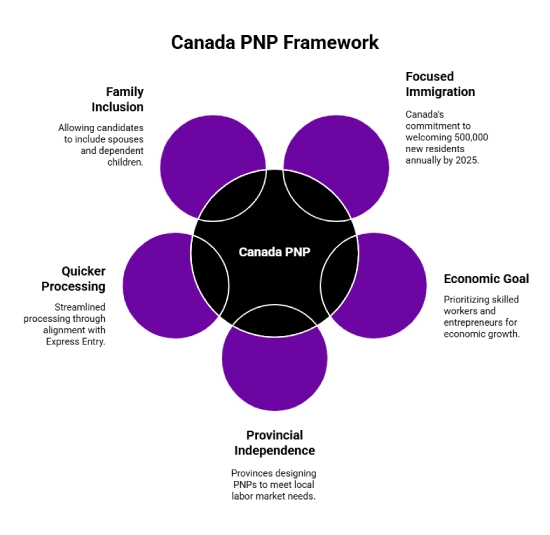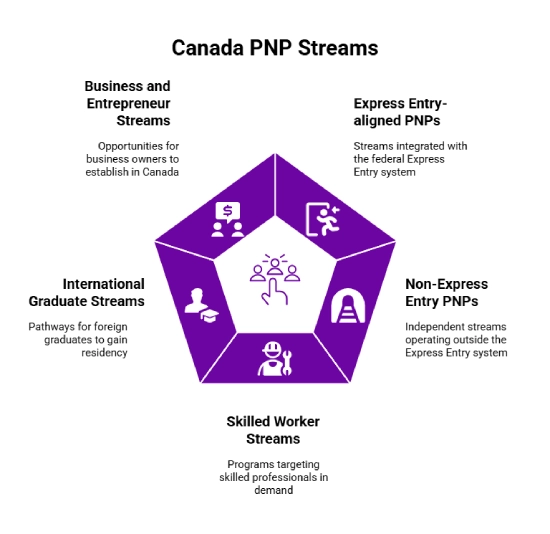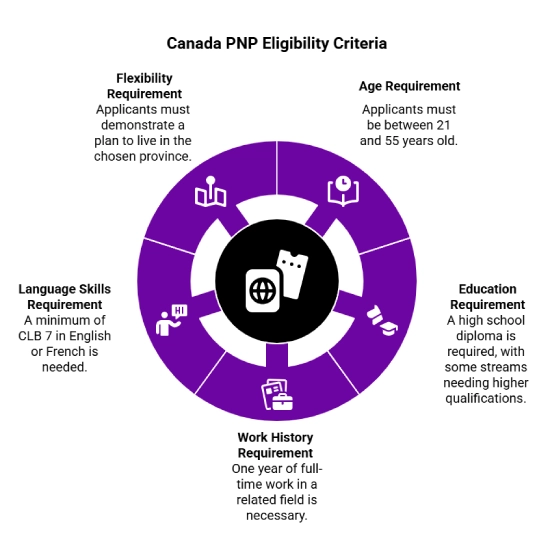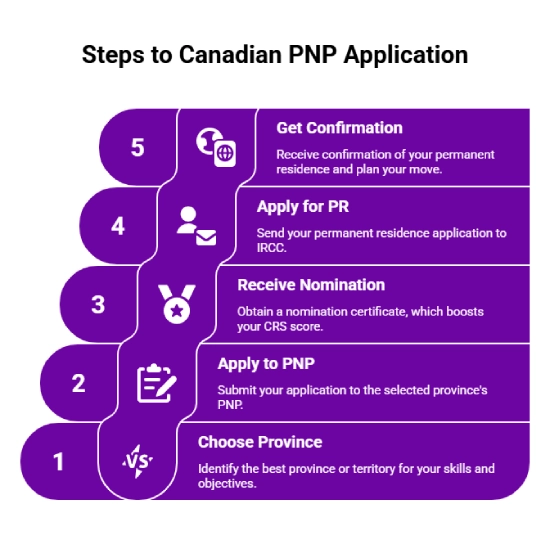Through aligning the capabilities of professionals and entrepreneurs from the UK with particular requirements in its provinces and territories, the Canada Provincial Nominee Program (PNP) provides a direct route to Canadian permanent residency.

The Provincial Nominee Program (PNP) allows skilled workers, graduates, and entrepreneurs to immigrate to Canada and become permanent residents. Except for Quebec and Nunavut, each province and territory operates its own PNP to meet local economic and labor demands by attracting suitable individuals.
Key aspects of PNPs:
*Need guidance to apply for Canada immigration? Y-Axis is here to support you with the process.
The benefits of the Canada PNP are given below.
Provincial Nominee Programs in Canada have different streams for various needs and purposed, such as skilled workers, foreign graduates, and business owners. These streams are either connected to the federal Express Entry system or work on their own as base PNPs. Each province's tracks may focus on certain jobs, industries, or areas that need workers.
Some of the popular Canada PNP streams are:

Provincial Nominee Programs (PNPs) that align with Canada Express Entry, sometimes called “enhanced” PNPs, provide skilled workers ways to obtain Canadian permanent residence. These options connect to the federal Express Entry system. So, candidates must start by making an Express Entry profile and meeting the criteria for one of the main economic immigration programs handled by Express Entry: the Federal Skilled Worker Program, the Federal Skilled Trades Program, or the Canadian Experience Class.
The Non-Express Entry Provincial Nominee Program (PNP) gives people a way to immigrate to Canada and become permanent residents if a province or territory nominates them. Instead of the Express Entry system, where candidates are ranked and invited from their profiles, Non-Express Entry PNPs let people apply straight to a province or territory. Application depends on the region's needs and criteria. This option works well for those who do not qualify for or want to use the Express Entry system.
Canada has multiple Skilled Worker programs that allow immigrants to get permanent resident status based on their skills and job history. The federal government mainly manages these programs through the Express Entry system. Provinces and territories also run their own programs called Provincial Nominee Programs (PNPs). The federal government also has programs outside Express Entry to meet specific job market demands.
International Graduate Streams are immigration routes under Canadian Provincial Nominee Programs (PNPs). They help international students who've graduated from Canadian schools become permanent residents. These programs give priority to applicants with Canadian education and, in many cases, a job offer.
In January 2025, the British Columbia Provincial Nominee Program (BC PNP) launched three new streams for international graduates. These Bachelor's, Master's, and Doctorate streams replaced the old International Graduate and International Post-Graduate streams and are for graduates with degrees from approved schools.
Business and entrepreneurship can be divided into categories based on elements like how big the business is, the kind of innovation used, and its community impact. Key categories include small businesses, startups made to expand, social enterprises, big companies, and innovative ventures. Also, specific fields such as tech businesses, environmentally-friendly businesses, and intrapreneurship show different methods in the wider area.
Many UK applicants want to become permanent residents of Canada. They often apply through Provincial Nominee Programs (PNPs), and some provinces are more commonly chosen.
Some of the popular PNP provinces are given below.
| PNP Name | Key Focus Areas | Ideal For |
| Ontario Immigrant Nominee Program (OINP) | Tech, healthcare, finance, skilled trades | Skilled workers, IT professionals, international grads |
| Tech, business, tourism, health care | Tech workers, entrepreneurs, graduates | |
| Engineering, energy, agriculture, healthcare | Skilled workers with ties to Alberta | |
| Saskatchewan Immigrant Nominee Program (SINP) | Agriculture, trades, healthcare, hospitality | Workers with moderate CRS scores |
| Manitoba Provincial Nominee Program (MPNP) | Skilled workers, community connections, entrepreneurs | Candidates with job offers or Manitoba ties |
| Nova Scotia Nominee Program (NSNP) | Healthcare, education, IT, rural development | Professionals in high-demand sectors |
| IT, education, transport, bilingual roles | French/English speakers, skilled workers | |
| Agriculture, fisheries, healthcare, hospitality | Small business owners, rural-focused applicants | |
| NL Provincial Nominee Program (NLPNP) | Tech, oil & gas, skilled trades | Tech professionals and skilled newcomers |
| Quebec Skilled Worker Program (QSWP) | Francophone-focused, IT, health, education | French-speaking professionals |
| Program | 2025 Allocation |
| British Columbia Provincial Nominee Program (BC PNP) | 4,000 (‑50% vs 2024). BC will accept ~1,100 new applications in 2025 and use the rest to clear inventory. |
| Saskatchewan Immigrant Nominee Program (SINP) | 3,625 (province notes a 50% cut and program changes). |
| Manitoba Provincial Nominee Program (MPNP) | 4,750 (2025) |
| New Brunswick Provincial Nominee Program (NBPNP) | No number posted; province confirms significant reductions, controlled reopening (Feb 2025). AIP paused Apr 4, 2025 upon reaching allocation. |
| Newfoundland & Labrador PNP (NLPNP) | 2,050 PNP spaces for 2025 (after federal cuts, NL negotiated an increase from 1,050 to 2,050). |
| Québec Skilled Worker Program (QSWP / PSTQ) | Admissions plan 2025: 48,500–51,500 permanent admissions under regular stream |
The eligibility criteria for Canada PNP are given below.

*Want to check your eligibility for Canada immigration? Use Y-Axis Canada Immigration Points Calculator for FREE and instant results.
The documents required to apply for Canada PNP are given below.
The procedure to apply for Canada PNP is given below.
Step 1: Determine the Canadian province or territory that best fits your skills, work history, or business objectives.
Step 2: Apply directly to the province’s Provincial Nominee Program (PNP), or make an Express Entry profile if applying via an aligned stream.
Step 3: If your application is approved, you will get a nomination certificate. For Express Entry-aligned streams, this certificate provides 600 points toward your Comprehensive Ranking System (CRS) score.
Step 4: After getting a nomination, send a permanent residence application to Immigration, Refugees and Citizenship Canada (IRCC), either through Express Entry or via mail.
Step 5: IRCC will process your application. If approved, you will get confirmation of your permanent residence and can then plan your move to Canada.

Detailed information about the processing time for Canada PNP is given below.
| PNP Stream | Estimated Processing Time |
| Express Entry-aligned PNPs | 6–8 months |
| Non-Express Entry PNPs | 15–19 months |
| Skilled Worker Streams | 6–12 months |
| International Graduate Streams | 4–10 months |
| Business and Entrepreneur Streams | 18–30 months |
In 2025, Canada’s Provincial Nominee Programs (PNPs) are experiencing longer processing times due to reduced federal immigration allocations. Under the new Immigration Levels Plan 2025–2027, the total national PNP target was cut by about 50%, meaning fewer spaces for each province.
Many provinces are now focusing on clearing existing backlogs before inviting new applicants:
British Columbia has a 4,000 nomination limit for 2025 and will accept only about 1,100 new applications, using most of its quota to process pending files.
Manitoba and Saskatchewan have reduced the size and frequency of their draws to manage smaller allocations.
For applicants, this means:
Longer waits between submitting an Expression of Interest (EOI) and receiving an Invitation to Apply (ITA).
Some streams may be temporarily paused or issue very few invitations.
After receiving a provincial nomination, IRCC’s federal processing for permanent residence can still take several months
Detailed information about the application fee for Canada PNP is given below.
| PNP Stream | Provincial Nomination Fee (CAD) | IRCC Permanent Residence Fee (CAD) |
| Express Entry-aligned PNPs | $250 – $1,500 | $1,365 |
| Non-Express Entry PNPs | $250 – $1,500 | $1,365 |
| Skilled Worker Streams | $350 – $1,500 | $1,365 |
| International Graduate Streams | $250 – $1,000 | $1,365 |
| Business and Entrepreneur Streams | $1,000 – $3,500 | $1,810 |
| Feature | Express Entry‑Linked PNP (Enhanced Streams) | Non‑Express Entry PNP (Base Streams) |
| Connection to federal system | Linked directly to IRCC’s Express Entry system. | Managed entirely by the province/territory outside Express Entry; PR is filed via the non‑EE process. |
| Eligibility | Must meet both the provincial stream criteria and one of the federal EE programs (FSW, FST, CEC). | Must meet the specific province’s criteria (often job offer/employer sponsorship/local ties); no EE eligibility required. |
| CRS points benefit | A provincial nomination in EE gives +600 CRS points, which typically leads to a quick ITA in EE rounds. | No CRS points. After provincial nomination, you submit PR directly to IRCC under the non‑EE PNP route. |
| Processing speed | Faster: IRCC’s service standard targets 6 months for most complete Express Entry PR applications. (Actual times can vary.) | Typically longer than Express Entry; timelines vary by category and volume. Always check IRCC’s Check processing times tool. |
| Examples (official) | BC PNP Skills Immigration streams with EEBC option; Ontario Human Capital Priorities (EE). | BC PNP Skills Immigration (non‑EE options), SK Occupations In‑Demand, MB Skilled Worker pathways (non‑EE). |
Yes, you can include your family members in your Canada PNP applications. When applying for a Canada PNP, it is usually required to include all dependent family members, even if they are not immigrating with you. This usually means your spouse or common-law partner, dependent children, and any dependent children of your dependent children (grandchildren).
Who can be included:
Not including all family members who are eligible may cause your application to be denied or make it harder to sponsor them in the future.
Provincial Nominee Programs in Canada provide a path to Canada PR or permanent residency, leading to citizenship. After a province nominates them, candidates can seek permanent resident status using the Express Entry system or a paper application. To maintain permanent resident status, individuals must reside in Canada for three years out of five, file income taxes, and meet language and legal standards. Upon meeting eligibility criteria, individuals may apply for Canadian citizenship, which involves a citizenship exam and proof of English or French competence. This option suits skilled employees, graduates, and business owners aiming to reside in Canada long term.
Maintaining open and prompt dialogue with provincial authorities and IRCC is important, especially when delays or changes could have an impact on your eligibility or the time it takes to process your application.
Y-Axis provides support to help you deal with changes during your Provincial Nominee Program (PNP) application, keeping your chances for Canadian permanent residency alive.
Our services include:
With Y-Axis, you can manage changes to your immigration plan with reliable advice at all times.
Explore what Global Citizens have to say about Y-Axis in shaping their future
Australia Skilled Migration Visa
One of our client Kavitha applied for Au
Read More...
Australia PR Visa
Ms. Subhashini got Australia Permanent R
Read More...
Australia PR Visa
Our client Varun Mathur gave a good feed
Read More...
The Provincial Nominee Program in Canada lets provinces and territories nominate people who want to immigrate and live in that particular region. Each province has its own PNP, which focuses on skilled workers, graduates, and entrepreneurs, depending on the local job market's demands. You can apply either directly to the province or through the Express Entry system, which gives you an extra 600 points on your profile.
After a nomination, you can apply for permanent residency through Immigration, Refugees and Citizenship Canada (IRCC). The PNP is a useful choice for applicants who do not have high scores on the Express Entry system or who have connections to a certain province.
No, you do not always need a job offer to apply for Canada PNP. Many Provincial Nominee Programs (PNPs) need a job offer from a Canadian company, but not all do. For example, Saskatchewan and Ontario have programs where people in certain jobs, or those with high education and language scores, can apply without a job. A job offer can still make an application stronger and faster to approve. Because each program is different, applicants should carefully check the rules for the province they want to apply to.
Provincial Nominee Program (PNP) eligibility differs based on the province and the specific PNP stream. Typical requirements are:
Some programs also need:
Entrepreneur streams might also need:
PNPs linked to Express Entry need candidates to meet federal requirements, like those for the Federal Skilled Worker Program (FSWP) or the Canadian Experience Class (CEC).
The processing time for Canada PNP applications varies by streams. Detailed information about the processing times is given below.
| PNP Stream | Estimated Processing Time |
| Express Entry-aligned PNPs | 6–8 months |
| Non-Express Entry PNPs | 15–19 months |
| Skilled Worker Streams | 6–12 months |
| International Graduate Streams | 4–10 months |
| Business and Entrepreneur Streams | 18–30 months |
Yes, you can include your family in the Canada PNP application. Your spouse or common-law partner and dependent children (under 22) can be included in your Provincial Nominee Program (PNP) application and processed for permanent residence with you if you meet the financial and eligibility needs. After approval, your spouse can work, and your children can study in Canada. Remember to include all family members in their application.
Here are some Canadian provinces with popular Provincial Nominee Programs (PNP):
To apply for Canada PNP, you require the documents given below.
Express Entry also needs:
Business applicants might need:
Translate and certify any non-English documents. Check the province's document list to be sure.
Yes, you must take IELTS or a language test to be eligible to apply for Canada PNP. Generally, Provincial Nominee Programs (PNPs) need language skill proof in English or French via tests like IELTS, CELPIP, or TEF. The needed score varies by program. Express Entry streams usually ask for at least CLB 7 for Federal Skilled Worker, although a better score can raise your CRS score. Some base streams might accept lower scores. Test results must come from an approved agency and be less than two years old when you apply.
Yes, international graduates can apply under Canada PNP. Many provinces have International Graduate Streams within their Provincial Nominee Programs (PNPs). Usually, applicants need to finish a post-secondary program at a recognized Canadian school, often in that same province. Some streams want a job offer after school, while others focus on sought-after jobs or language skills. International graduates may have an advantage because they have studied in Canada, which shows they can adapt and have connections in the province.
Yes, you can switch provinces after receiving a Canada PNP nomination, however applicants are advised not to do so. While technically permissible, moving to a different province soon after receiving a PNP is not advisable. Such actions may bring up concerns about misrepresentation, potentially affecting future immigration attempts. It is important to show a real commitment to living and working in the nominating province. Permanent residents have mobility rights under the Canadian Charter.
Canada’s 2025 Immigration Levels Plan reduced the Provincial Nominee Program (PNP) target by 50%, cutting allocations from 110,000 in 2024 to 55,000 in 2025. IRCC introduced this change to address housing shortages, infrastructure strain, and public concerns about the pace of immigration growth. The government aims to better balance economic needs, regional priorities, and integration capacity. As a result, provinces now have significantly reduced nomination caps, which increases competition and requires more targeted selection of candidates with in-demand skills and strong ties to the province.
Yes, British Columbia closed its PNP International Graduate stream on November 26, 2024, and its International Post-Graduate stream on January 7, 2025. While three new graduate streams were planned for launch in 2025, BC PNP indefinitely suspended their introduction as of April 14, 2025, citing reduced federal PNP quota allocations. International graduates who would have qualified for these programs are encouraged to explore alternative pathways such as BC PNP skilled worker categories, Express Entry–linked streams, or other federal immigration programs.
The Manitoba Provincial Nominee Program (MPNP) has been allocated 4,750 nominations for 2025, down from its 2024 quota of 9,500, due to the nationwide 50% reduction in PNP targets. As of the latest mid-year data, 1,840 nominations have already been issued, leaving about 2,910 spots for the remainder of the year. Manitoba is prioritizing applicants in high-demand occupations and those with strong provincial ties. With the reduced allocation, competition is much tighter, and draw sizes are smaller, making it critical for candidates to closely track draw updates and target priority selection categories.
The table below has the major differences between Express Entry and non-EE PNP streams:
| Feature | Express Entry (Enhanced PNP Streams) | Non-Express Entry (Base PNP Streams) |
| System | Managed under Canada’s federal, points-based Express Entry system | Operate entirely outside the Express Entry system |
| Points & Ranking | Candidates ranked via the Comprehensive Ranking System (CRS) | No CRS ranking; eligibility based on provincial criteria |
| PNP Nomination Effect | Adds 600 CRS points, virtually guaranteeing an Invitation to Apply (ITA) for PR | No CRS points; nomination leads to a direct PR application to IRCC |
| Application Process | Create an Express Entry profile → receive provincial nomination → update profile with 600 points → receive ITA → submit e-APR to IRCC | Apply directly to a province → receive nomination → submit PR application (paper or online) to IRCC |
| Processing Speed | Generally faster (federal Express Entry processing times apply) | Typically slower (paper-based PR processing times apply) |
| Eligibility Criteria | Must meet both federal Express Entry requirements and provincial criteria | Must meet only the specific province’s eligibility requirements |
| Outcome | Permanent Residence | Permanent Residence |
Yes, most provinces have slowed or reduced PNP draw activity in 2025 due to the halved federal quota. Provinces are being more selective, often focusing on candidates in priority occupations or with strong local ties. However, Express Entry–linked PNP draws remain active, accounting for nearly half of all Express Entry invitations issued in early 2025. While base PNP streams have slowed, enhanced streams continue to operate at a steady pace.
The Provincial Nominee Program (PNP) is one of the most effective pathways for skilled workers, entrepreneurs, and professionals to secure Canadian permanent residency. It allows provinces and territories to nominate candidates based on their local labour market needs, increasing your chances of selection even with lower CRS scores in Express Entry. By applying through a PNP, you align your skills with provincial demand, boosting both eligibility and settlement opportunities.
Key benefits include: